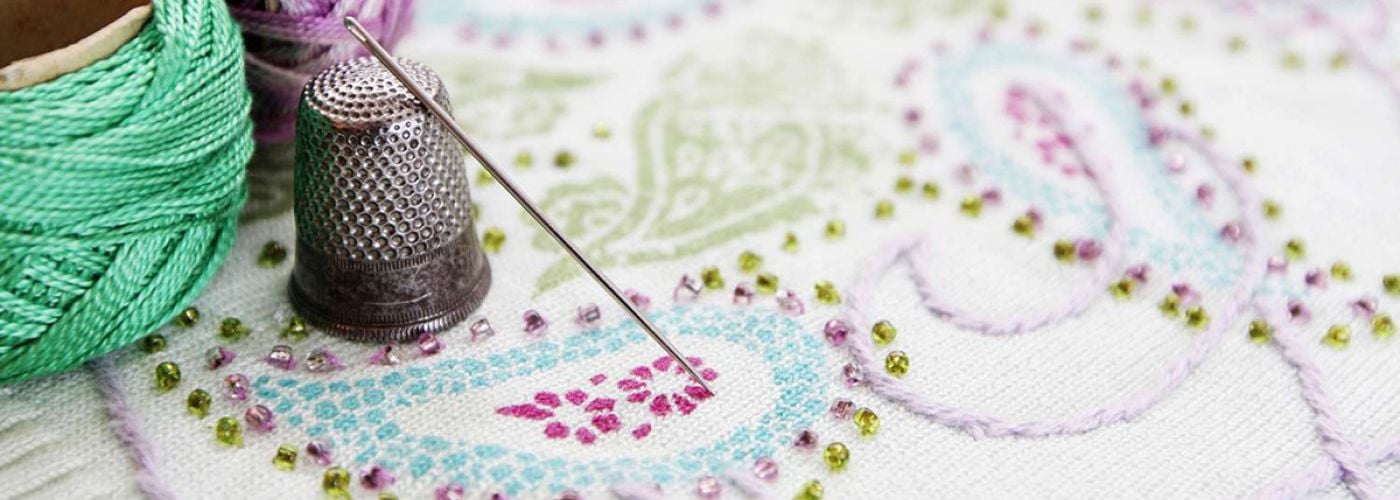
A Guide to Thread for Hand Embroidery
Embroidery is a timeless art form, allowing creators to add personality, color, and intricate detail to textiles. From detailed wall art to embellished clothing, the possibilities are vast. However, the quality of any embroidered piece depends heavily on a fundamental component: the thread. Choosing the right thread for hand embroidery is crucial, as it impacts the final texture, appearance, and longevity of the work. Different threads are suited for different fabrics and project goals, so selecting the appropriate embroidery thread depends on the type of fabric being used.
This guide will explore the different types of threads available and how to select the best one for your project. Popular options like DMC thread and other brands offer a wide variety of choices for hand embroidery.
Types of Hand Embroidery Threads
Understanding the characteristics of various threads is the first step toward achieving your desired stitching effect. Each type offers a unique finish and is suited for different applications.
Don't hesitate to explore other threads beyond the most common types to expand your creative possibilities in hand embroidery.
Cotton Embroidery Floss
Cotton embroidery floss is perhaps the most recognized and widely used thread for hand embroidery. It consists of six strands of cotton that can be easily separated (making it a divisible thread), meaning embroidery floss is a type of divisible thread that allows you to separate the strands for different effects. Allowing stitchers to adjust the thickness of their stitches by using one or more strands at a time. For example, you can separate the floss into two strands for medium coverage, or use a single thread for the finest details. Its soft, matte finish makes it incredibly versatile for a wide range of projects, from delicate, single-strand details to bold, full-strand statements.
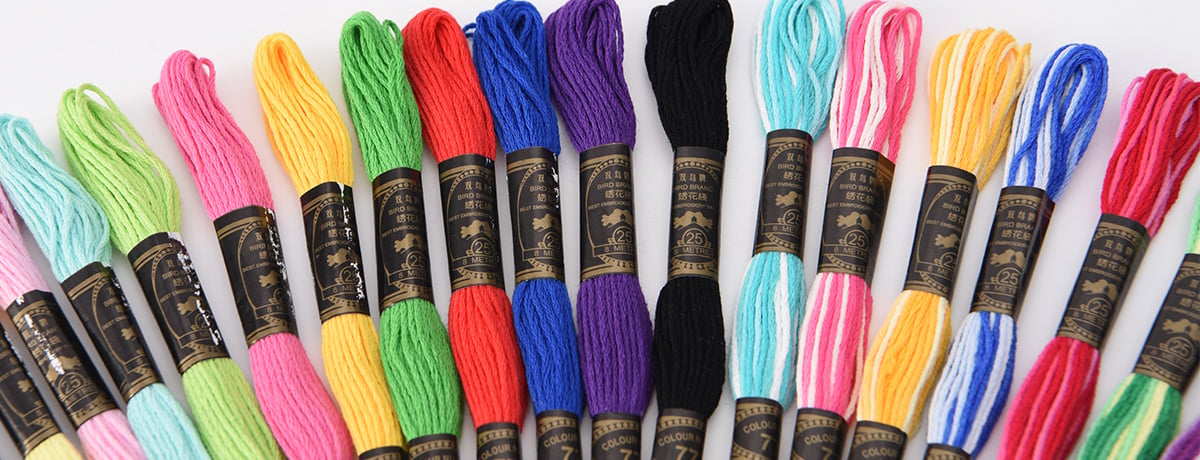
Pearl Cotton Thread
Pearl cotton, or coton perlé (also known as perle cotton), is a non-divisible, two-ply thread that is distinguished by its twisted structure and lustrous sheen. Unlike standard cotton floss, it has a smooth, rounded surface that gives stitches a raised, textured appearance; its tight twist contributes to both its strength and textured look. It is available in various weights (thicknesses), with common sizes being 3, 5, 8, and 12—the higher the number, the finer the thread. Perle cotton is typically available in four sizes to accommodate different embroidery techniques and texture effects. Pearl cotton is an excellent choice for bold outlines, textured fills, and decorative stitches in projects like Redwork or Hardanger embroidery.
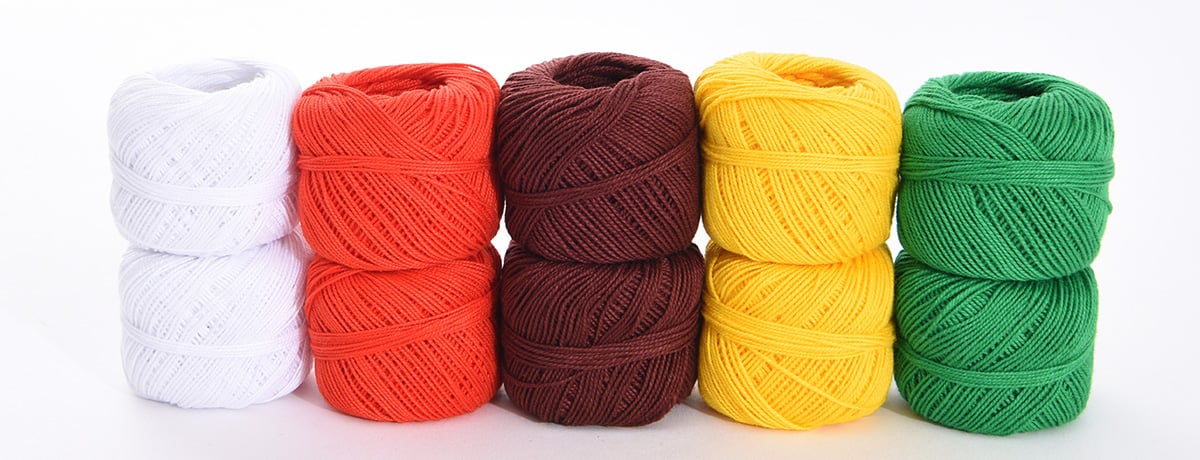
Silk Threads
For projects requiring a touch of luxury and exceptional fineness, silk threads are an ideal option. Silk offers an unmatched natural luster and smoothness, allowing it to pass through fabric with minimal friction. This makes it perfect for intricate, high-detail work and creating smooth satin stitches. While it can be more delicate to work with, the beautiful sheen and vibrant color saturation of silk thread provide a truly premium finish for high-end fashion embellishments and fine art embroidery. Silk threads are often hand-dyed or variegated, which enhances their color variation and visual interest, making them especially appealing for projects that require unique color blending and depth.
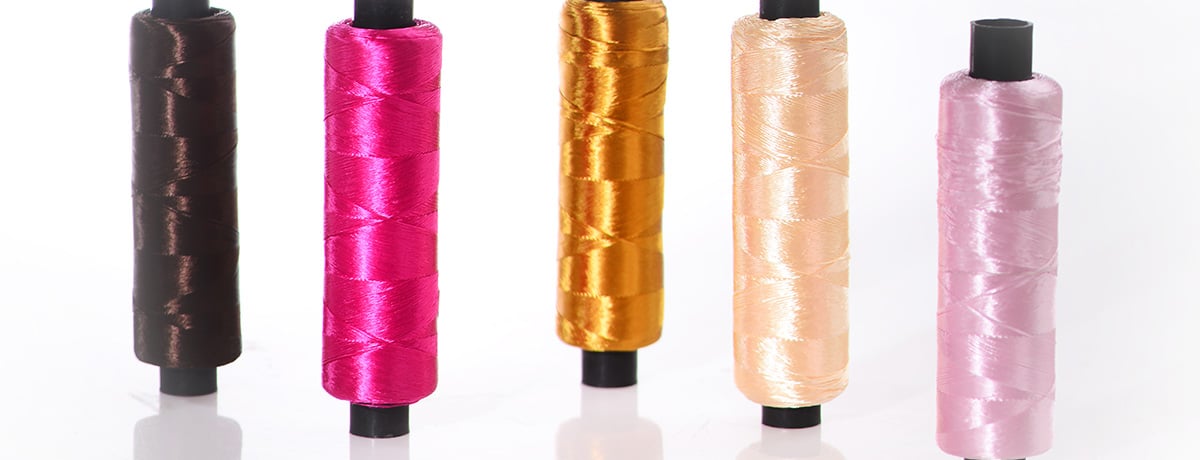
Metallic Threads
Metallic threads are used to add sparkle and a dynamic, eye-catching dimension to embroidery. These threads are typically made from a synthetic core wrapped in a thin metallic filament. They come in a variety of styles, including smooth braids, shimmering twists, and holographic finishes. While they can be challenging to work with due to their tendency to snag or unravel, the dazzling effect they create is well worth the effort. Metallic threads are often used for festive decorations, accent details on clothing, and adding highlights to pictorial embroidery.
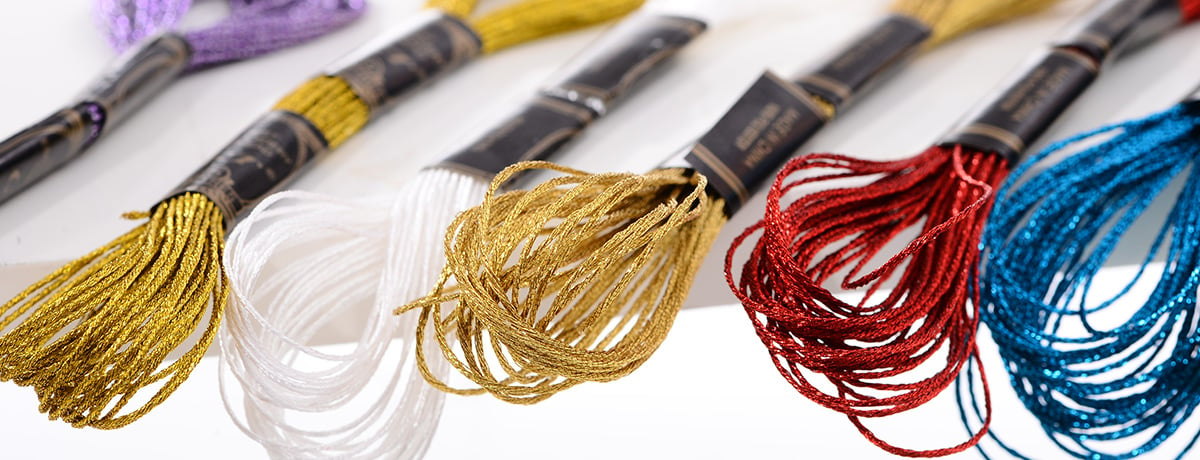
Choosing the Best Thread for Hand Embroidery
Selecting the appropriate thread involves more than just picking a color. Several factors should be considered to ensure the best possible outcome for your project.
For those looking to deepen their understanding, a fantastic resource such as a comprehensive embroidery book or guide can provide valuable tips and inspiration for choosing the right threads and mastering various techniques.
-
Durability: Projects like clothing, accessories, or items that will be handled frequently require a durable, colorfast thread that can withstand washing and wear. Choosing a durable thread is essential for long-lasting results. Some threads, such as polyester, are especially valued for their strength, resistance to being washed frequently, and ability to maintain color and integrity over time.
-
Texture: The texture of the thread can affect the final look of your embroidery. Cotton floss is smooth and versatile, while linen or wool threads offer a more rustic, textured appearance. Some threads have a fuzzy texture, which can create a softer, worn-in look but may be more prone to tangling.
-
Ease of Use: Beginners often prefer cotton floss, as they are generally easier to handle than slippery silk or stiff metallic threads. Threads with a fuzzy texture may be more prone to tangling, and using shorter lengths can help prevent breakage and make stitching more manageable.
-
Availability: Embroidery threads are available in a wide range of colors and materials at most craft stores. They are typically sold in skeins and are widely available in craft stores, making it easy to find the perfect match for your project.
While embroidery thread can sometimes be used for machine sewing, it is important to select the appropriate thread type for the intended application to ensure the best results.
Factors to Consider
-
Thickness (Weight): The thread's thickness will determine the prominence of your stitches. Finer threads are suited for delicate details, while thicker threads create bold, visible lines.
-
Sheen: The level of shine affects the final look. Matte threads, like cotton floss, offer a traditional, flat finish. Lustrous threads, such as pearl cotton and silk, provide a subtle or high-gloss sheen that catches the light.
-
Durability: Consider the end use of the project. Items that will be laundered frequently, like clothing or table linens, require a durable, colorfast thread that can withstand washing and wear.
-
Ease of Use: Beginners may prefer working with cotton floss or pearl cotton, as they are generally easier to handle than slippery silk or stiff metallic threads.
Matching Thread to Fabric and Stitch Style
The thread should always be compatible with the fabric. A general rule is to use a thread that is slightly finer than the threads of the fabric to avoid distorting the weave. For example, lightweight fabrics like lawn or voile pair well with single strands of cotton floss or fine silk. Heavier fabrics such as denim or canvas can support thicker threads like pearl cotton or multiple strands of floss.
The stitch style also dictates thread choice. Textured stitches like French knots or bullion knots are more prominent when created with a rounded thread like pearl cotton. The final appearance of your stitched design will depend on the combination of thread type and stitch technique. For smooth, flat coverage, such as in satin stitch, a divisible floss or fine silk thread works best.
Creative Applications of Hand Embroidery Threads
Embroidery threads can be used to transform ordinary items into unique, personalized pieces.
-
Clothing Embellishments: Add floral motifs to a denim jacket, monograms to shirt cuffs, or decorative borders to a dress.
-
Home Décor: Create custom cushions, embellish table linens, or design unique embroidered wall art that reflects your personal style.
-
Personalized Gifts: A hand-embroidered handkerchief, tote bag, or baby blanket makes for a thoughtful and cherished gift.

Tips for Working with Hand Embroidery Threads
Proper technique and care can significantly improve your stitching experience and the quality of your finished work.
-
Storage: Keep threads organized and away from direct sunlight to prevent tangling and fading. Bobbins or floss organizers are useful for this purpose.
-
Needle Selection: Use the correct needle size for your thread. The eye of the needle should be large enough for the thread to pass through easily, but not so large that it creates noticeable holes in the fabric.
-
Using a Hoop: An embroidery hoop keeps the fabric taut, which helps maintain even tension and prevents puckering.
-
Use Shorter Lengths: When working with delicate or specialty threads like spun silk or silk chenille, use shorter lengths of thread to prevent tangling, fraying, and breakage.
-
Test Your Stitches: Before beginning your main project, it is wise to test your thread colors and stitch choices on a scrap piece of the same fabric.
Thread Care: Preserving and Storing Your Embroidery Threads
Caring for your embroidery threads is just as important as choosing the right ones for your project. To keep your threads in top condition, always store them in a cool, dry place away from direct sunlight, which can cause fading and weaken fibers over time. Moisture and extreme temperatures can damage both cotton and silk threads, so avoid storing them in damp basements or hot attics. For silk threads and other delicate fibers, opt for breathable containers or fabric pouches that allow air circulation while protecting against dust and moisture buildup.
When organizing your embroidery threads, consider separating different types—such as machine embroidery threads, silk threads, and cotton threads—using acid-free tissue or cloth. This prevents color transfer and tangling, especially when storing multiple shades or brands together. Thread cones and spools with protective caps are ideal for machine embroidery threads, helping to keep them dust-free and tangle-free. Regularly check your threads for signs of fraying or breakage, and gently dust or clean them as needed to maintain their durability and vibrant color.
By taking these simple steps, you’ll ensure your embroidery threads remain smooth, strong, and ready for your next creative embroidery project—whether you’re working with delicate silk, sturdy cotton, or specialty machine embroidery threads.
Top Thread Brands for Hand Embroidery
Selecting the right thread brand can elevate your hand embroidery from good to truly exceptional. Trusted brands are known for their consistent quality, vibrant colors, and reliable performance across a variety of projects. DMC is a favorite among stitchers worldwide, offering a vast palette of cotton threads and the iconic six stranded cotton embroidery floss, perfect for everything from cross stitch to surface embroidery. For those seeking luxurious silk threads or shimmering metallic threads, ITO provides a beautiful range that adds a touch of elegance and shine to your stitching.
Venne is another excellent choice, especially if you’re looking for high-quality cotton threads, including mercerized cotton and even specialty tapestry wool for textured effects. Anchor, Sulky, and Madeira are also respected brands, each bringing unique strengths—whether it’s Anchor’s rich colorfast cotton, Sulky’s innovative machine embroidery threads, or Madeira’s extensive selection of thread weights and fibers.
When choosing a thread brand, consider the fiber content, thread weight, and colorfastness to ensure you’re using the right thread for your fabric and stitch style. Exploring different brands and types of threads can introduce you to new textures, finishes, and decorative touches, helping you achieve the perfect thread match for every embroidery project. Whether you prefer the matte finish of cotton, the nice sheen of silk, or the sparkle of metallic threads, experimenting with various brands is a fantastic way to expand your creative possibilities and discover the difference quality threads can make.
MH: A Reliable Source for Embroidery Threads
For hobbyists, designers, and businesses, sourcing high-quality materials is essential. MH is a trusted leader in the textile industry, offering a comprehensive selection of embroidery threads to meet a variety of needs. We provide a wide range of colors and thread types, all manufactured to consistent, high-quality standards.
Our wholesale supply capabilities ensure that both small-scale crafters and large-scale manufacturers have access to the materials they need for their creative and professional projects.
To explore our extensive range of embroidery threads and other tailoring materials, we invite you to inquire about our bulk order options. Equip your projects with the quality and variety that only a dedicated supplier can provide.
 Whatsapp:
Whatsapp: